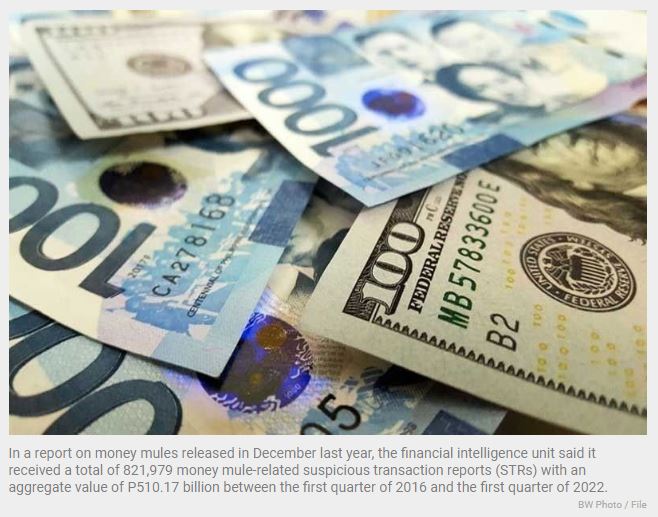AMLC warns money mules scams rising in Philippines
MANILA, Philippines — The Anti-Money Laundering Council (AMLC) is ramping up its campaign against money mules as the number and value of suspicious transactions rose sharply starting 2021 with the emergence of digital banking and electronic wallets.
In a report on money mules released in December last year, the financial intelligence unit said it received a total of 821,979 money mule-related suspicious transaction reports (STRs) with an aggregate value of P510.17 billion between the first quarter of 2016 and the first quarter of 2022.
Of the total number, about 99.35 percent or 816,674 suspicious transactions were submitted by electronic money issuers (EMIs), followed by commercial banks (3,687 suspicious transactions), money service businesses (1,444 ), pawnshops (149), rural and cooperative banks (21), as well as savings and mortgage banks (four).
After a steady increase since 2016, the year-on-year growth in the number of suspicious transactions related to money mules dramatically exploded to 732,392 in 2021.
“The sharp increase in the number of submitted STRs in 2021 can be attributed to the emergence and accelerated adoption of digital banking and electronic wallets, which did not only provide alternative payment methods but also made financial transactions easier and safer in the midst and in the wake of the COVID-19 pandemic,” the AMLC said.
According to the AMLC, the jump is consistent with the reported volume of electronic fund transfers through PESONet and InstaPay transactions, which posted a 164-percent and 223-percent growth, respectively, in the first half of 2021.
Data showed the amount of STRs related to money mules hit P505.99 billion in 2021 and accounted for 99.18 percent of the total value during the six-year period.
The surge in value was due to an attempted account opening with an initial deposit of $10 billion or P503.75 billion in a bank in Bonifacio Global City in Taguig. The reporting covered person was not able to validate the source of funds involved.
The financial intelligence unit said a significant share of the sample suspicious transactions were filed on the basis of two suspicious circumstances, namely: there is no underlying legal or trade obligation, purpose or economic justification (SI1)” and the amount involved is not commensurate with the business or financial capacity of the client.
In terms of value, the AMLC said the suspicious circumstance was the client was not properly identified. The top predicate crime in terms of both volume and value appeared to be swindling.
It was noted that the suspected money mules in the Philippines utilize three modes of withdrawing funds led by electronic cash cards, automated teller machines (ATMs) and over the counter.
Further, majority of the suspected money mules were found to be residing in Metro Manila, Rizal, Nueva Ecija, Cavite, Bulacan and Laguna.
According to the report, suspected money mules are involved in fund transfers through self-service kiosks, opening of digital bank accounts and electronic wallets using sequential mobile identification numbers, multiple cash and check deposits followed by large-value withdrawals, cash and animal smuggling, opening an account on behalf of another individual, purporting to be a member of Marine Corps, receiving funds using drop accounts bought in the dark web, fund flipping and illegal gambling, particularly illegal cockfighting.
Given the seemingly rampancy of money mules in the country, the AMLC said the report highlights the need to raise awareness among the covered persons so that they may prevent money mules from taking advantage of the existing financial infrastructures.
Likewise, there is a need to educate the general public about the suspicious activities and notable typologies of money mules, so they may protect themselves from being victimized.
Moving forward, the AMLC may consider including the typologies identified in the study on Targeted Intelligence Packaging Workshops with law enforcement agencies (LEAs) to further both parties’ knowledge on money mules.
In addition, the AMLC may consider issuing a notice discouraging promo gaming activities such as “Send Money Challenge” as this can be exploited for money mules.
With the growing popularity of these alternative platforms, the need to raise awareness about the suspicious activities and modus operandi of money mules is underscored.
“Thus, the dissemination of this report to law enforcement agencies, supervising authorities, other government agencies, covered persons with public-private partnership agreement with the AMLC, other financial intelligence units, and the general public is recommended,” the study stated.
Source: https://www.philstar.com/business/2023/02/13/2244465/amlc-warns-money-mules-scams-rising-philippines


 English
English




